Showing posts with label sega master system. Show all posts
Showing posts with label sega master system. Show all posts
Tuesday, May 4, 2010
HG101 Podcast Episode 6 - The Sega Master System
I love the Sega Master System. A huge chunk of that has to do with it being my own first console (not counting the household Ataris, which were technically my parents.) While its library has not aged nearly as well as the NES', there are still a number of really excellent games, and at very least, there's a lot of interesting history behind them.
So, myself, Andrew "Vysethebold" and Rob "Quickpaw" sat down to talk at length about the Sega Master System. And when I say "at length", I mean, AT LENGTH. Including music, the total running time is three and a half hours, which suggests we may have gone a bit overboard. But it's also an extremely extensive podcast, as we discuss pretty much everything related to the system - its origins, its accessories, and its most notable games, including Alex Kidd, Zillion, Wonder Boy, Miracle Warriors, Phantasy Star, Shinobi, Cyborg Hunter, Fantasy Zone, and many, MANY more. (Looking back on it, we forgot to discuss Snail Maze as we mention earlier on. D'oh.) Enjoy!
Download:
Fileplanet
Megaupload
Sunday, February 28, 2010
The Sega Newsletter
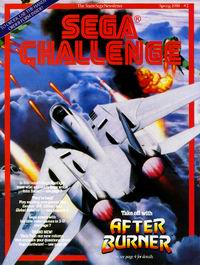
Back when I was about 7 or so, I took the finest double spaced paper from my penmanship class, stole a stamp from my parents, and wrote a letter, in pencil, to Sega of America, telling them they should have a newsletter like the Nintendo Fun Club. (I didn't own an NES back then, but my dad was a mail carrier, and he used to bring home any issues which were undeliverable.) A few weeks later, I got a typed letter thanking me for my enthusiasm, along with stack of about 20 pages of paper detailing hints and cheats for every game on the system, as well as an issue of Sega Challenge.
Sega Challenge was pretty much what I had asked for. It was just like the Nintendo Fun Club, in that it was very short and more of a promotional brochure than a magazine, but it was exciting nonetheless. After all, this was around 1988 or so - I'm not sure of Electronic Gaming Monthly or Video Games & Computer Entertainment had started yet, so getting any kind of information about video gaming was fairly precious.
Well, my old copies got thrown in the trash years and years ago, but the awesome folks at Zap! Online have been scanning them for your enjoyment. It's pretty amazing looking back on these. I actually had my parents order me a Sega Challenge t-shirt way back when, and I MAY have had a Sega beach towel (or I desperately wanted one, I can't remember.) I also got my copy of Power Strike through them, which wasn't officially released in retail stores at the time. (I think some copies bled through from Canada or something a few years later - I'm bit a sketchy on the details.)
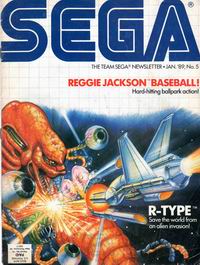
They also sold these promotional tapes that were about half an hour long each, and had recordings of about a dozen Sega products. Which, again, were amazing, considering I only had one friend with a Master System, and there was no place to rent games, so it was a fine way to check out a game without dumping $50+ (three months of allowance!) on one. I still have these in my closet - I've thought about recording them, although the HG101 Digital Archive Project has come to a standstill due to Fileplanet deleting some of my files, and my computer's inability to transfer stuff to Megaupload.
Anyway, Sega Challenge soon became the Team Sega Newsletter after a few issues, then eventually became Sega Visions, which was a bit more of proper magazines like Nintendo Power, complete with reviews and such, although it was obviously still biased. It was still free for awhile, then they started charging for subscriptions, at which point I had dropped it. Still, this is a great look at Master System history!
This all came up regarding a not-yet-posted article on Sword of Vermilion. I edited in a part about Sega's slogan at the time being "Sega does what Nintendon't", but someone brought that this didn't start until the Genesis era, where it was actually "Genesis does what Nintendon't". I swear that, since I was on the Sega mailing list, I got some brochures (specifically advertising Double Dragon and Vigilante, these were separate from the newsletters) with this slogan. But since Sega didn't actually advertise these in magazines, I can't find any solid proof. Did I dream this up or misremember it, or can anyone corroborate it?
Thursday, November 26, 2009
HG101 Digital Archive Project - Zillion
The HG101 Digital Archive Project already hit its first stumbling block. Originally I had anticipated on storing all of these on my Fileplanet account, a holdover from the IGN/Gamespy hosting days of a few months ago. I was under the impression that we would keep these accounts, but no - the server was simply turned off last week without them telling anyone. All of the files are still accessible, but we can't upload anything more. The public upload utility is still there, though, which I think I'll have to use, going forward. Fileplanet has always sucked, but it's also more reliable than Megaupload, whose links haphazardly disappear for any number of arbitrary reasons.

But, we'll work with it! I recorded and encoded the first two episodes of the Zillion anime. For quick reference, Zillion was apparently some kind of laser tag toy from the mid-80s, which the anime (and video games) were tied into. Despite obviously being essentially little more than advertisements, I've always held a weakpoint for it, because those little doodles in the SMS game manual was essentially my introduction to anime. I was disappointed when I saw the anime and found that JJ, the awesome guy from the game, was kinda of a weenie in the show, but hey - Apple and Champ are still badass, those guns still look cool no matter how cheesy they are, and the Norsa (or Noza as they're called here) are still pretty badass. The anime shares a lot of music with the game, too, featuring vocal 80s J-pop renditions of much of the soundtrack.

Although there were numerous episodes televised in Japan, the US only got a handful - five tapes with a single 20 minute episode each, and a sixth tape with a 40 minute OVA. They were dubbed by Streamline Pictures, the same guys responsible for Macross and basically any of the anime distributed in the US during the 80s. The dubbing is actually quite good and they're still fairly watchable. Please enjoy. The Japanese episodes are also being fansubbed over at Anime Classic, so you can look forward to the episodes not released in English.
Just keep in mind that the quality on the second episode is a little sketchy near the end due to the iffy tape I have. The only VCR I have has a tendency to display a large ugly "VIDEO RECALIBRATION" message whenever it gets too staticy, which pops up a couple of times. It's annoying, but better than watching them on Youtube, at any rate.
Episode 1 - They Call me J.J.
Episode 2 - Hang Fire

But, we'll work with it! I recorded and encoded the first two episodes of the Zillion anime. For quick reference, Zillion was apparently some kind of laser tag toy from the mid-80s, which the anime (and video games) were tied into. Despite obviously being essentially little more than advertisements, I've always held a weakpoint for it, because those little doodles in the SMS game manual was essentially my introduction to anime. I was disappointed when I saw the anime and found that JJ, the awesome guy from the game, was kinda of a weenie in the show, but hey - Apple and Champ are still badass, those guns still look cool no matter how cheesy they are, and the Norsa (or Noza as they're called here) are still pretty badass. The anime shares a lot of music with the game, too, featuring vocal 80s J-pop renditions of much of the soundtrack.

Although there were numerous episodes televised in Japan, the US only got a handful - five tapes with a single 20 minute episode each, and a sixth tape with a 40 minute OVA. They were dubbed by Streamline Pictures, the same guys responsible for Macross and basically any of the anime distributed in the US during the 80s. The dubbing is actually quite good and they're still fairly watchable. Please enjoy. The Japanese episodes are also being fansubbed over at Anime Classic, so you can look forward to the episodes not released in English.
Just keep in mind that the quality on the second episode is a little sketchy near the end due to the iffy tape I have. The only VCR I have has a tendency to display a large ugly "VIDEO RECALIBRATION" message whenever it gets too staticy, which pops up a couple of times. It's annoying, but better than watching them on Youtube, at any rate.
Episode 1 - They Call me J.J.
Episode 2 - Hang Fire
Monday, September 7, 2009
Fun Sega Master System trivia - Part 1
I love the Sega Master System. A lot of just has to with childhood attachment and all of that, but there's just so much weird history behind a lot of the games, the kind that people tend to gloss over because...well, not many people really care about the poor thing. And so, for part 1 in a series (??) of fun facts about the system...a lot of this is covered already in various HG101 articles, but if you haven't combed through the entirety of the library, hopefully you'll find something interesting here.
-There were numerous Sega Master System games that originated on Japanese PCs. Sega had a pretty good working relationship with Compile, who ported their MSX shooter Aleste (known as Power Strike outside of Japan) as well as Golvellius. Other games include Miracle WarriorsAKA Haja no Fuuin (Sega's version of the game is substantially better than the original PC version, which also showed up on the Famicom) and Psychic World (which was originally called Psycho World - the SMS version was only released in PAL territories, but it came out in the US for the Game Gear)

Super Cooks

Super Cooks
-There are three versions of Golvellius - for the MSX, MSX2 and Sega Master System - and all have different world and stage layouts. The game promised a sequel, which never technically came to pass, but Compile did create a tribute on one of their MSX DiskStation releases under the name Super Cooks. It looks and controls exactly like Golvellius, with brand new stages, except everything is food themed.
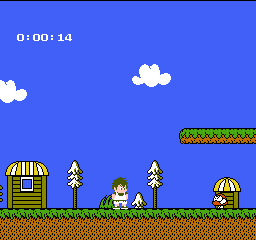
Kid Kool
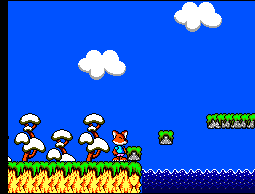
Psycho Fox
-Psycho Fox bears a suspicious resemblance to an NES game called Kid Kool, known in Japan as Kakefu Kimi no Jump Tengoku: Speed Jigoku. It looks and plays extremely similarly, although Psycho Fox definitely looks much better. What's even more bizarre is that the game concept was expanded upon and received a "sort of" sequel in the form of Magical Hat no Buttobi Turbo! Daibouken for the Sega Mega Drive. This game, based off of an anime license, got a complete makeover and became Decap Attack in America. The levels in these games are mostly the same, with some minor differences, despite the graphical changes. Why are these games all so similar? They were all developed by Vic Tokai.
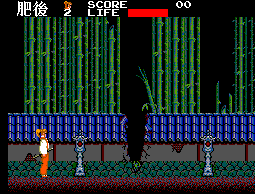
Kenseiden (Japanese)
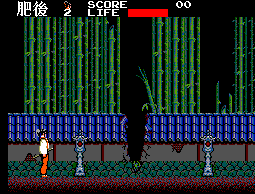
Kenseiden (USA/Europe)
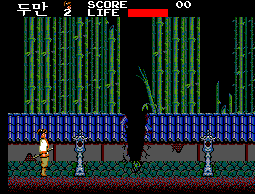
Kenseiden (Korea)
-In the Japanese version of the samurai action-platformer Kenseiden, the main character has blonde hair, which is even shown on the game's cover. Perhaps this was deemed too manga-esque, because all of the other versions give him more typical black hair.
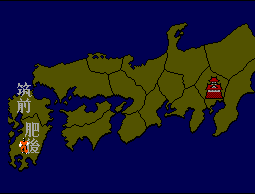
Kenseiden (Japanese/USA/Europe)
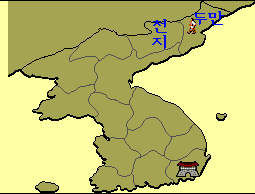
Kenseiden (Korea)
-Korea, not having the best relations with Japan, tends to remove any reference to samurai or medieval Japan. Most of Kenseiden is the same, but the old Japanese map between levels is replaced with a map of Korea. The sprite was also changed again slightly, though I can't quite say why - maybe the outfit is more "Korean"? (Other examples of this include Mitsurugi being replaced with "Arthur" in the Soul Calibur games, the renaming of SNK's The Last Blade to "The Last Soldier", and Samurai Shodown renamed as "Fighters Swords".
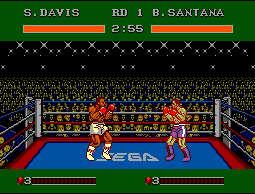
Heavyweight Champion
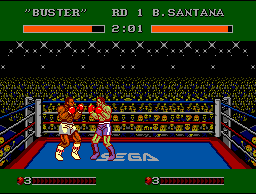
Buster Douglas Knockout Boxing
-Heavyweight Champion is a standard boxing game, similar to Rocky but a bit better. When Sega acquired the rights to Buster Douglas, it was re-released as James 'Buster' Douglas Knockout Boxing. The title screen is different and the main character's name is changed from "S. Davis" to "Buster", but otherwise the games are exactly the same. Strangely, it's one of the most valuable SMS titles released in the West.
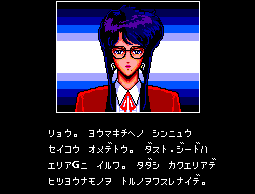
Chouon Senshi Borgman
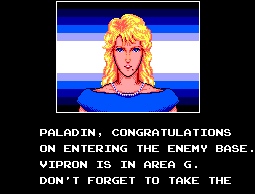
Cyborg Hunter
-Several SMS games were originally based on various anime/manga properties, which had to be changed in the West. These include Hokuto no Ken, which became Black Belt (and its Genesis sequel became Last Battle), Kujaku-Oh (The Peacock King) became Spellcaster (and its Genesis sequel became Mystic Defender), Anmitsu Hime became Alex Kidd in High Tech World, and Chouon Senshi Borgman became Cyborg Hunter. In Black Belt's case, all of the graphics were completely redone. Alex Kidd had some graphical changes, but was otherwise mostly the same. Spellcaster and Cyborg Hunter had some minor changes but mostly just switches names. The only anime license that made it to America unscathed were the two Zillion games. A few others that didn't make it out of Japan include Sukeban Deka II (which combines adventure segments with action beat-em-up segments, similar to Spellcaster) and Tensai Bakabon.

Chouon Senshi Borgman

Chouon Senshi Borgman
-The ending of Cyborg Hunter mentions Paladin, the name of the main character, as well as two other characters named Trevor and Catherine, who aren't mentioned anywhere else at all. In the Japanese version, these were two other characters from the anime - Anis Farm and Chuck Sweager. The main character is Ryo Hibiki instead of Paladin. One of the guns is also called the Zillion in the Japanese version, but was changed to a more boring "Ray Gun" for the other releases. Chouon Senshi Borgman, along with Bomber Raid, were two of the last Mark III games released in Japan, and thus, are fairly pricey. One of the anime series was localized by ADV and released on DVD under the title Sonic Soldier Borgman, back when they were indiscriminately licensing stuff. It's more or less a standard Bubble Gum Crisis ripoff.
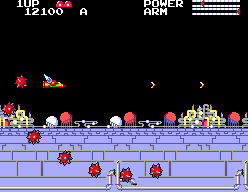
Transbot (SMS)
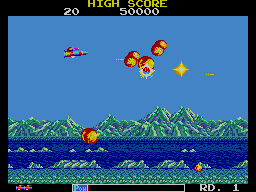
Astro Flash (Arcade)
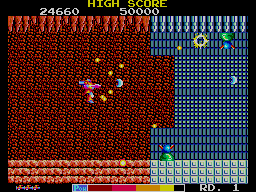
Astro Flash (Arcade)
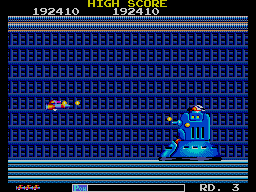
Astro Flash (Arcade)
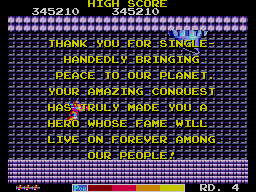
Astro Flash (Arcade)
-Transbot (also known as Astro Flash) was an early Sega Master System shooter that came on one of those cards. There was actually an arcade version of the title that came out for the System E arcade board, which was essentially a slightly enhanced Master System. While it was also called Astro Flash, it was called Transformer in other regions. Anyway, while it shares the same theme, it's a completely different game. The Master System version contained a few stages over some moon-like planet that repeated over and over, along with an alternate underground tunnel stage. By destroying a specific truck, you can transform into different shapes, each with different weapons. The Arcade version actually has a definite end - there are four stages total, each with an above and below ground section. You can transform between ship and robot form at any time, each of which has a different weapon. You gain power by destroying enemies, which in turn strengthens your weapons. The graphics are completely different, although it shares the same affection for multi-plane backgrounds - this and Black Belt were incredibly impressive back in 1986.
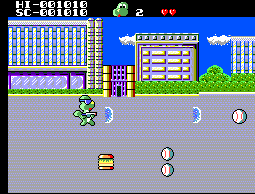
The Dinosaur Dooley
-It's relatively well known that the Sega Master System was fairly popular in Brazil, but it also got some additional support in Korea. One of these games was The Dinosaur Dooley, which was based off a popular cartoon character. It's a fairly lousy side-scrolling shooter, but it's weirdly notable because the soundtrack consists of lousy chiptunes renditions of American rock music, like Nirvana's "Smells Like Teen Spirit", Soup Dragons' "Divine Thing" and "Pleasure", Spin Doctors' "Two Princes", and Ugly Kid Joe's "Everything About You".
-There were numerous Sega Master System games that originated on Japanese PCs. Sega had a pretty good working relationship with Compile, who ported their MSX shooter Aleste (known as Power Strike outside of Japan) as well as Golvellius. Other games include Miracle WarriorsAKA Haja no Fuuin (Sega's version of the game is substantially better than the original PC version, which also showed up on the Famicom) and Psychic World (which was originally called Psycho World - the SMS version was only released in PAL territories, but it came out in the US for the Game Gear)

Super Cooks

Super Cooks
-There are three versions of Golvellius - for the MSX, MSX2 and Sega Master System - and all have different world and stage layouts. The game promised a sequel, which never technically came to pass, but Compile did create a tribute on one of their MSX DiskStation releases under the name Super Cooks. It looks and controls exactly like Golvellius, with brand new stages, except everything is food themed.

Kid Kool

Psycho Fox
-Psycho Fox bears a suspicious resemblance to an NES game called Kid Kool, known in Japan as Kakefu Kimi no Jump Tengoku: Speed Jigoku. It looks and plays extremely similarly, although Psycho Fox definitely looks much better. What's even more bizarre is that the game concept was expanded upon and received a "sort of" sequel in the form of Magical Hat no Buttobi Turbo! Daibouken for the Sega Mega Drive. This game, based off of an anime license, got a complete makeover and became Decap Attack in America. The levels in these games are mostly the same, with some minor differences, despite the graphical changes. Why are these games all so similar? They were all developed by Vic Tokai.

Kenseiden (Japanese)

Kenseiden (USA/Europe)

Kenseiden (Korea)
-In the Japanese version of the samurai action-platformer Kenseiden, the main character has blonde hair, which is even shown on the game's cover. Perhaps this was deemed too manga-esque, because all of the other versions give him more typical black hair.

Kenseiden (Japanese/USA/Europe)

Kenseiden (Korea)
-Korea, not having the best relations with Japan, tends to remove any reference to samurai or medieval Japan. Most of Kenseiden is the same, but the old Japanese map between levels is replaced with a map of Korea. The sprite was also changed again slightly, though I can't quite say why - maybe the outfit is more "Korean"? (Other examples of this include Mitsurugi being replaced with "Arthur" in the Soul Calibur games, the renaming of SNK's The Last Blade to "The Last Soldier", and Samurai Shodown renamed as "Fighters Swords".

Heavyweight Champion

Buster Douglas Knockout Boxing
-Heavyweight Champion is a standard boxing game, similar to Rocky but a bit better. When Sega acquired the rights to Buster Douglas, it was re-released as James 'Buster' Douglas Knockout Boxing. The title screen is different and the main character's name is changed from "S. Davis" to "Buster", but otherwise the games are exactly the same. Strangely, it's one of the most valuable SMS titles released in the West.

Chouon Senshi Borgman

Cyborg Hunter
-Several SMS games were originally based on various anime/manga properties, which had to be changed in the West. These include Hokuto no Ken, which became Black Belt (and its Genesis sequel became Last Battle), Kujaku-Oh (The Peacock King) became Spellcaster (and its Genesis sequel became Mystic Defender), Anmitsu Hime became Alex Kidd in High Tech World, and Chouon Senshi Borgman became Cyborg Hunter. In Black Belt's case, all of the graphics were completely redone. Alex Kidd had some graphical changes, but was otherwise mostly the same. Spellcaster and Cyborg Hunter had some minor changes but mostly just switches names. The only anime license that made it to America unscathed were the two Zillion games. A few others that didn't make it out of Japan include Sukeban Deka II (which combines adventure segments with action beat-em-up segments, similar to Spellcaster) and Tensai Bakabon.

Chouon Senshi Borgman

Chouon Senshi Borgman
-The ending of Cyborg Hunter mentions Paladin, the name of the main character, as well as two other characters named Trevor and Catherine, who aren't mentioned anywhere else at all. In the Japanese version, these were two other characters from the anime - Anis Farm and Chuck Sweager. The main character is Ryo Hibiki instead of Paladin. One of the guns is also called the Zillion in the Japanese version, but was changed to a more boring "Ray Gun" for the other releases. Chouon Senshi Borgman, along with Bomber Raid, were two of the last Mark III games released in Japan, and thus, are fairly pricey. One of the anime series was localized by ADV and released on DVD under the title Sonic Soldier Borgman, back when they were indiscriminately licensing stuff. It's more or less a standard Bubble Gum Crisis ripoff.

Transbot (SMS)

Astro Flash (Arcade)

Astro Flash (Arcade)

Astro Flash (Arcade)

Astro Flash (Arcade)
-Transbot (also known as Astro Flash) was an early Sega Master System shooter that came on one of those cards. There was actually an arcade version of the title that came out for the System E arcade board, which was essentially a slightly enhanced Master System. While it was also called Astro Flash, it was called Transformer in other regions. Anyway, while it shares the same theme, it's a completely different game. The Master System version contained a few stages over some moon-like planet that repeated over and over, along with an alternate underground tunnel stage. By destroying a specific truck, you can transform into different shapes, each with different weapons. The Arcade version actually has a definite end - there are four stages total, each with an above and below ground section. You can transform between ship and robot form at any time, each of which has a different weapon. You gain power by destroying enemies, which in turn strengthens your weapons. The graphics are completely different, although it shares the same affection for multi-plane backgrounds - this and Black Belt were incredibly impressive back in 1986.

The Dinosaur Dooley
-It's relatively well known that the Sega Master System was fairly popular in Brazil, but it also got some additional support in Korea. One of these games was The Dinosaur Dooley, which was based off a popular cartoon character. It's a fairly lousy side-scrolling shooter, but it's weirdly notable because the soundtrack consists of lousy chiptunes renditions of American rock music, like Nirvana's "Smells Like Teen Spirit", Soup Dragons' "Divine Thing" and "Pleasure", Spin Doctors' "Two Princes", and Ugly Kid Joe's "Everything About You".
Labels:
cyborg hunter,
golvellius,
kenseiden,
sega master system,
transbot
Subscribe to:
Posts (Atom)

